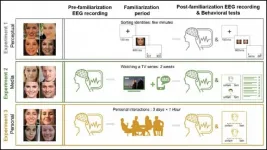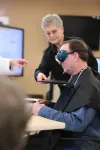(Press-News.org) Ecology, the field of biology devoted to the study of organisms and their natural environments, needs to account for the historical legacy of colonialism that has shaped people and the natural world, researchers argued in a new perspective in the journal Nature Ecology & Evolution.
To make ecology more inclusive of the world's diverse people and cultures living in diverse ecosystems, researchers from University of Cape Town, North West University in South Africa and North Carolina State University proposed five strategies to untangle the impacts of colonialism on research and thinking in the field today.
"There are significant biases in our understanding of ecology and ecosystems because of this colonial framework of thinking," said perspective co-author Madhusudan Katti, associate professor for leadership in public science, and forestry and environmental resources at NC State. "We are challenging ecologists to understand and address the legacies of colonialism, and to start engaging in an active process of 'decolonizing science.'"
The researchers described emerging research documenting impacts of European colonialism - the migration, settlement and exploitation of the Americas, Africa, Asia and other parts of the world by people from Europe - on people and the natural world, and on ecology.
Katti said examples of how ecological research reflects the impact of colonialism include patterns of vegetation in cities that reflect patterns of racial segregation and discrimination, or in the use of names of prominent European scientists or their patrons in the scientific names for bird species and other organisms rather than names used by Indigenous people.
"Indigenous names are often based on observations of behavior or ecology, or represent cultural significance of species, but that traditional ecological knowledge is lost when names are changed," Katti said. "This is bad for both the colonized people and the science of ecology itself."
The researchers challenged the field to address colonial legacies using five strategies:
* Decolonize the mind. Researchers said this should be done by understanding other knowledge systems from colonized cultures.
* Know your history, or understand the history of colonialism in influencing Western ecology, and its role in promoting oppression of other people and in shaping the environment. "Ecology is about organisms living in their ecosystems - that's what we study," Katti said. "If you want to study ecology, that includes people. To understand how people shape ecosystems, we have to understand how political power works. Western ecologists have to acknowledge how science has been aligned with colonial power, and how it has been used to perpetuate systems of oppression that continue to this day."
* Decolonize information. They suggest this should be done by increasing access to academic information, and understanding power dynamics in the way data is owned and disseminated.
* Decolonize expertise by recognizing more diverse voices in the field of ecology.
* Establish diverse and inclusive teams to help overcome biases in future research. "The world is enriched by diverse perspectives," Katti said. "We need scientific teams where everybody is equally empowered to set a robust research agenda, and ensure more robust testing of these ideas. If the person with a different hypothesis is not in the room, then you're never challenged to test and prove their hypothesis, and you're subject to your own bias."
INFORMATION:
The perspective, "Decoloniality and anti-oppressive practices for a more ethical ecology," was published online in Nature Ecology & Evolution on May 24, 2021. It was authored by Katti, Christopher H. Trisos and Jess Auerbach. Trisos acknowledges funding from the National Socio Environmental Synthesis Center under funding received from the National Science Foundation (DBI-1639145) and FLAIR fellowship programme - a partnership between the African Academy of Sciences and Royal Society, funded by the UK Government's Global Challenges Research Fund.
-oleniacz-
Note to editors: The abstract follows.
"Decoloniality and anti-oppressive practices for a more ethical ecology"
Authors: Christopher H. Trisos, Jess Auerbach and Madhusudan Katti.
Published online May 24 in Nature Ecology and Evolution.
Abstract: Ecological research and practice are crucial to understanding and guiding more positive relationships between people and ecosystems. However, ecology as a discipline and the diversity of those who call themselves ecologists have also been shaped and held back by often exclusionary Western approaches to knowing and doing ecology. To overcome these historical constraints and to make ecology inclusive of the diverse peoples inhabiting Earth's varied ecosystems, ecologists must expand their knowledge, both in theory and practice, to incorporate varied perspectives, approaches and interpretations from, with and within the natural environment and across global systems. We outline five shifts that could help to transform academic ecological practice: decolonize your mind; know your histories; decolonize access; decolonize expertise; and practise ethical ecology in inclusive teams. We challenge the discipline to become more inclusive, creative and ethical at a moment when the perils of entrenched thinking have never been clearer.
The neural representation of a familiar face strengthens faster when you see someone in person, according to a new study published in JNeurosci.
The brain loves faces -- there's even an interconnected network of brain areas dedicated to face-processing. Despite all the research on how the brain sees faces, little is known about how the neural representation of a face changes as it becomes familiar.
To track how familiarity brain signals change, Ambrus et al. measured participants' brain activity with EEG before and after getting to know different ...
A strange phenomenon happens with modern blue whales, humpback whales and gray whales: they have teeth in the womb but are born toothless. Replacing the teeth is baleen, a series of plates composed of thin, hair- and fingernail-like structures growing from the roof of their mouths that act as a sieve for filter feeding small fish and tiny shrimp-like krill.
The disappearing embryonic teeth are testament to an evolutionary history from ancient whales that had teeth and consumed larger prey. Modern baleen whales on the other hand use their fringed baleen to strain their miniscule prey from water, hence the term filter feeding.
A new study that utilized high-resolution computed tomography (CT) to ...
East Hanover, NJ. May 24, 2021. A recent qualitative study of rehabilitation professionals caring for people with spatial neglect enabled researchers to identify interventions to improve rehabilitation outcomes. Experts reported that implementation of spatial neglect care depends on interventions involving family support and training, promotion of interdisciplinary collaboration, development of interprofessional vocabulary, and continuous treatment and follow-up assessment through care transitions.
The article, "Barriers and Facilitators to Rehabilitation Care of Individuals with Spatial ...
Scientists at the University of York have made significant progress in the development of a nasal spray treatment for patients with Parkinson's disease.
Researchers have developed a new gel that can adhere to tissue inside the nose alongside the drug levodopa, helping deliver treatment directly to the brain.
Levodopa is converted to dopamine in the brain, which makes-up for the deficit of dopamine-producing cells in Parkinson's patients, and helps treat the symptoms of the disease. Over extended periods of time, however, levodopa becomes less effective, and increased doses are needed.
Professor David Smith, from the ...
Extra funding should be made available for early years care in the wake of the pandemic, researchers say.
Experts at the University of Leeds, University of Oxford and Oxford Brookes University have made the call after assessing the benefits of early childhood education and care (ECEC) for children under three during COVID-19.
They found children who attended childcare outside the home throughout the first UK lockdown made greater gains in language and thinking skills, particularly if they were from less advantaged backgrounds.
And now they are making several policy recommendations ...
Research Study Key Takeaways:
Ridesharing can reduce a passenger's risk of being a target of sexual assault by providing a more reliable and timely transportation option for traveling to a safer place.
The entry of Uber into a city contributes to a 6.3% reduction in rape incidents.
A 1% increase in Uber pickups in a neighborhood translates to a more than 3% decrease in the likelihood of sexual assaults.
CATONSVILLE, MD, May 24, 2021 - Contrary to portraits painted in popular media, new research involving ridesharing services shows they provide an additional level of protection for potential sexual assault victims, particularly ...
Regular physical activity has positive effects on children's developing brain circuits, finds a Boston Children's Hospital study using neuroimaging data from nearly 6,000 early adolescents. Physical activity of any kind was associated with more efficiently organized, flexible, and robust brain networks, the researchers found. The more physical activity, the more "fit" the brain.
Findings were published in Cerebral Cortex on May 14.
"It didn't matter what kind of physical activity children were involved in - it only mattered that they were active," says Caterina Stamoulis, PhD, principal ...
The first detailed cross-section of a galaxy broadly similar to the Milky Way, published today, reveals that our galaxy evolved gradually, instead of being the result of a violent mash-up. The finding throws the origin story of our home into doubt.
The galaxy, dubbed UGC 10738, turns out to have distinct 'thick' and 'thin' discs similar to those of the Milky Way. This suggests, contrary to previous theories, that such structures are not the result of a rare long-ago collision with a smaller galaxy. They appear to be the product of more peaceful change.
And that is a game-changer. It means that our spiral galaxy home isn't the product of a freak accident. Instead, it ...
SPOKANE, Wash.-- Breast cancer screening took a sizeable hit during the COVID-19 pandemic, suggests new research that showed that the number of screening mammograms completed in a large group of women living in Washington State plummeted by nearly half. Published today in JAMA Network Open, the study found the steepest drop-offs among women of color and those living in rural communities.
"Detecting breast cancer at an early stage dramatically increases the chances that treatment will be successful," said lead study author Ofer Amram, an assistant professor in the Washington ...
What The Study Did: Researchers used clinical data to examine differences in breast cancer screenings before and during the COVID-19 pandemic overall and among sociodemographic groups. Data included completed screening mammograms within a large statewide nonprofit community health care system from April 2018 through December 2020.
Authors: Ofer Amram, Ph.D., of Washington State University in Spokane, is the corresponding author.
To access the embargoed study: Visit our For The Media website at this link https://media.jamanetwork.com/
(doi:10.1001/jamanetworkopen.2021.10946)
Editor's Note: The article includes funding/support disclosures. Please see the article for additional information, including other authors, author contributions ...


